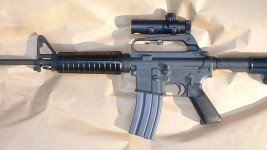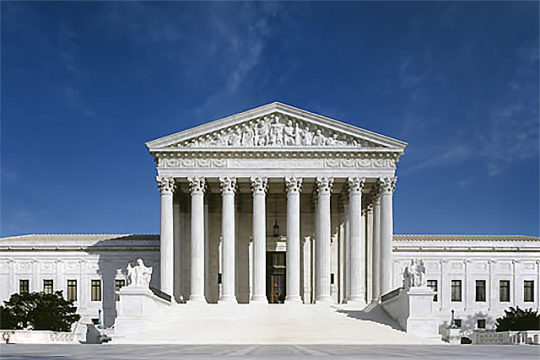The U.S. Supreme Court on Monday rejected an appeal from gun owners who challenged a Chicago suburb’s ban on assault weapons, acting in the aftermath of the California mass shooting.
Two conservative justices said they would have heard the case and struck down the ban.

Example of an assault weapon. Colt AR-15 Sporter SP1 Carbine. Photo by M62 on Flickr.
The court, though, left in place a lower court ruling that found that local governments have leeway in deciding how to regulate firearms. The federal appeals court in Chicago upheld the city of Highland Park’s 2013 gun law that bans semi-automatic weapons and large-capacity magazines.
In October, the federal appeals court in New York largely upheld similar laws in Connecticut and New York, among a handful of states that ban semi-automatic weapons.
The Supreme Court has repeatedly turned away challenges to gun restrictions since two landmark decisions that spelled out the right to a handgun to defend one’s own home.
Justice Clarence Thomas, joined by Justice Antonin Scalia, said the Chicago appeals court ruling “flouts two of our Second Amendment precedents.” Without mentioning any mass shootings in California and elsewhere that involved semi-automatic guns, Thomas said the weapons ban “is highly suspect because it broadly prohibits common semi-automatic firearms used for lawful purposes” by roughly five million Americans.
“The overwhelming majority of citizens who own and use such rifles do so for lawful purposes, including self-defense and target shooting,” Thomas wrote.
The case had been under consideration at the high court for two months, but the delay in dealing with it now appears mainly due to waiting for Thomas to finish his opinion.
The appeal filed by Dr. Arie Friedman and the Illinois State Rifle Association argues that Highland Park has violated their constitutional rights by banning some of the most popular semi-automatic guns in the United States, as well as ammunition magazines of more than 10 rounds.
Even though lower courts have mainly upheld gun restrictions, the Highland Park case arises out of a decision by the federal appeals court in Chicago that struck down the only statewide ban on carrying concealed weapons, in Illinois.
In 2013, when state lawmakers reacted to the court ruling by making it legal to carry a gun, they gave cities around the state 10 days to come up with local restrictions on assault weapons, or forfeit their right to do so.
Highland Park was one of fewer than 20 municipalities, all in the Chicago area, to enact regulations or bans, according to the rifle association.
The city’s assault weapons ban was upheld by the appeals court in a 2-1 decision.
Seven states and the District of Columbia have enacted laws banning assault weapons.
Story by the Associated Press
 CGTN America
CGTN America U.S. Supreme Court photo.
U.S. Supreme Court photo.
